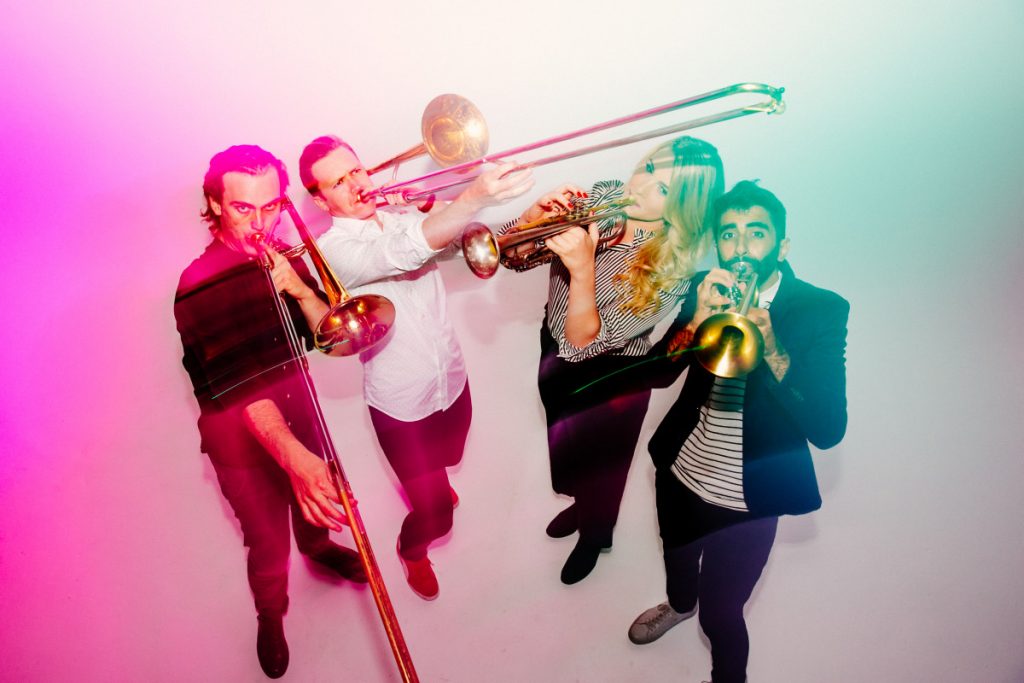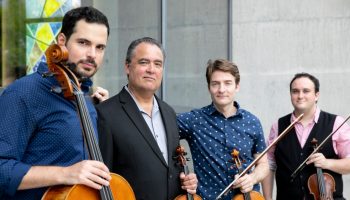
Sarah Russo
Staff writer
Before the Westerlies formed, the longtime friends who make up the quartet would pile in to a minivan owned by one of the trumpet player’s moms.
During the summers, the group would drive hundreds of miles playing house concerts, art galleries, coffee shops, or wherever anyone would take them.
Since then, the Westerlies have produced 10 albums, founded a record label and toured nationally.
The New York-based brass quartet will perform at 4 p.m. today in Elizabeth S. Lenna Hall for the Chautauqua Chamber Music Guest Artist Series.
Forming out of friendships in Seattle, the musicians that now make up the Westerlies first began performing with their own groups, improvising and writing music while in high school.
Riley Mulherkar, co-founder and trumpet player for the Westerlies, said the aim and the sound of the group has evolved since then.
“We had dreams of making music with our friends,” she said. “But over the years, once we really tried to find our sound as a brass ensemble, it led to a lot of discovery within the language and the repertoire of chamber music and brass music. There’s been a lot of evolution for us as a group in terms of how we identify and what we try to tackle musically.”
The Westerlies is comprised of Mulherkar and Chloe Rowlands on trumpet, and Andy Clausen and Willem de Koch on trombone.
Mixing ideas from jazz, new classical and folk into a brass ensemble, the group’s repertoire is ever-expanding, Mulherkar said. Members of the Westerlies write their own music, as well as curate adaptations of their own arrangements.
“There are certainly challenges (being a brass ensemble) and we’re also always just very jealous of string quartets because they have so much incredible music in their canon going back hundreds of years,” Mulherkar said. “The brass canon is certainly a more recent canon.”
For many concerts, Mulherkar said the group’s program is flexible and changes frequently.
Although the group didn’t share what selections they’re bringing to Chautauqua, Mulherkar said they are sure to feature tunes from their most recent album released in March, which features new classical and contemporary classical composers.
“There usually tends to be quite a variety in any given program, and we have a general idea of what we’re doing coming in,” Mulherkar said. “But sometimes five minutes before the show we’ll say, ‘Why don’t we throw in this thing,’ or, ‘Why don’t we try this?’ ”
Brass ensembles are inherently different from string quartets. Trumpets and trombones look and sound different from a violin, viola or cello, she said, and string groups are stereotypically considered more classical and refined compared to the power and timbre of brass.
Mulherkar said there still is something so exciting about presenting music as an all-brass group.
“One thing we particularly love about brass music is subverting the expectations that people have around brass,” Mulherkar said. “I think folks usually will come into a concert expecting more of a fanfare sound or more of a majestic Olympic sound of brass. And our core sound is a very quiet sound and we love to bring people close to us and into the music.”
In the nearly 12 years since the group’s beginning, Mulherkar said the community they’ve created and grown in is one of the best things to come out of forming the Westerlies.
“I think for me, the most rewarding part actually doesn’t end up being the music itself as much as just the people you meet and the community you build through it all,” Mulherkar said.




